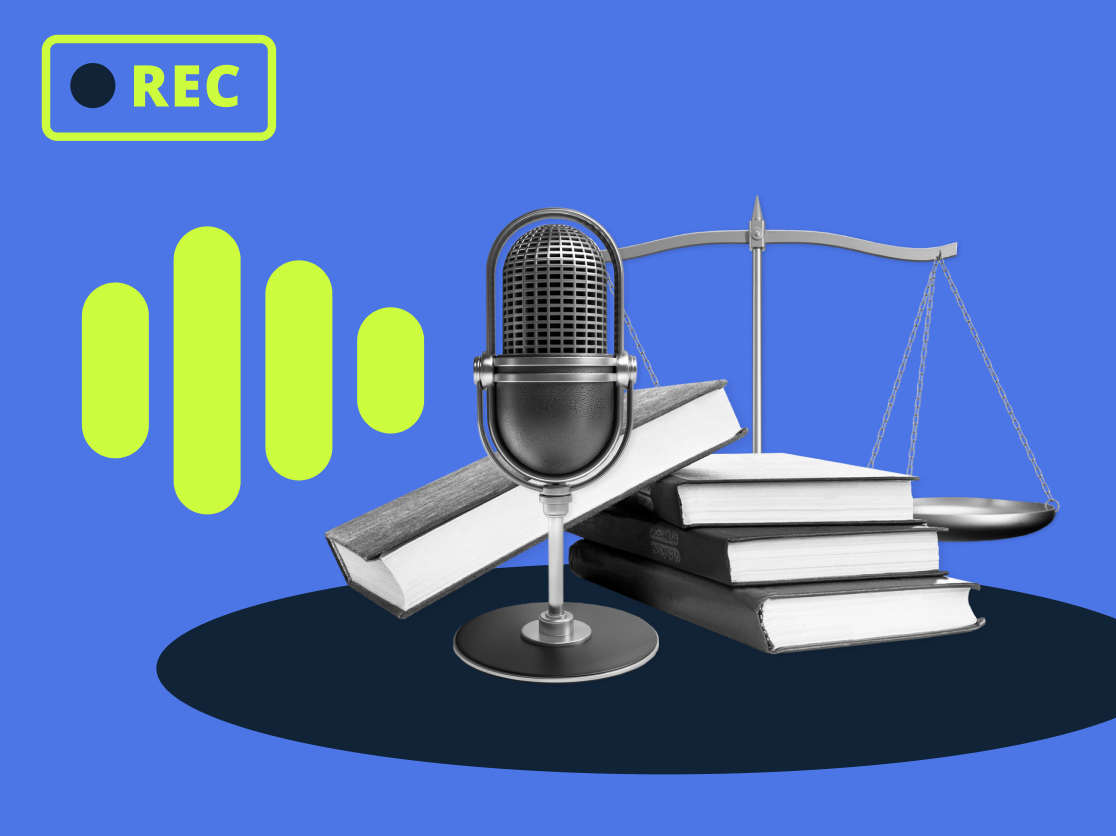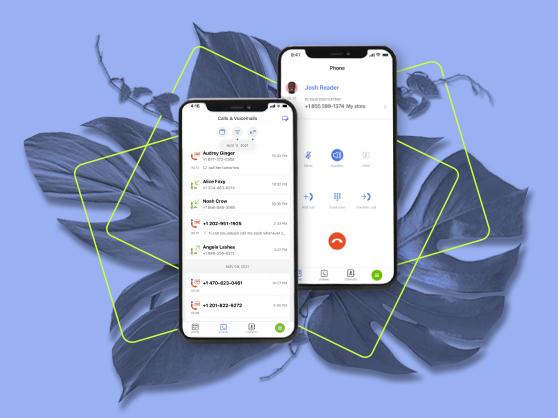Can I use my personal phone for business? To give you a short answer, yes. However, there will be disadvantages you need to consider. Taking your personal phone for work purposes may be your first instinct, and it may even function well at first, yet soon you will discover that there is a reason why most users end up switching to a separate business phone.
Here we have prepared a thorough overview of all the advantages and disadvantages you may come across while using your personal phone for business.
In this article we will cover:
- Who Uses a Personal Mobile Phone for Work?
- Work Phone and Personal Phone: What to Choose?
- Use Your Individual Phone for Business Safely with MightyCall
- Types of Workplace Cell Phone Policies
- How to Safely Allow Employees to Use Personal Cell Phones for Business?
- Does Employer Have to Reimburse Cell Phone Expenses?
- Choose the Option That Works Best for Your Team
Who Uses a Personal Phone for Work?
Mobile phones are always with us, in our pockets, on our office desks, in the bathrooms. When we need to make a call or send a text, we automatically reach for them. That is, people who are constantly making business calls are the ones who use their cell phones the most for their job:
- Sales/ account/ project managers: making sales, communicating effectively, placing and receiving orders, and managing a team;
- Support teams: being there for the clients, sometimes 24/7;
- Couriers/ delivery: receiving operator calls, contacting clients to confirm orders, GPS;
- Drivers: contacting clients, GPS, maintenance calls;
- Teachers/ private instructors: staying in touch with the students, teaching online classes.
Most professionals nowadays use their personal cell phones for work in one way or another, so the dilemma regarding work phone vs personal phone is not rare.
Work Phone and Personal Phone: What to Choose?
So, will a personal phone do the job, or is it best to use a company phone? Here are the main pros and cons to consider:
Reasons to use a personal phone for work
Pros:
- Easy set-up and use. Most likely, you already have a cell phone on you at all times, so it won’t take much time or effort to start using it for business. You will not have to set all the settings all over again or install any new apps.
- Control. You choose the smartphone model you like and the operating system of your preference. The size, color, stickers—customize it all you want, delete apps you dislike, take pictures of your cat and sunsets without having to ask permission.
- Responsibility. Cracking the screen or losing the phone will not be a constant fear, since the property is yours, no need for any reimbursements for anything. It is okay if your dog chews on it a bit or if your kid decorates it with a cute puppy sticker.
- Availability. Your personal phone is available to you at any point in time, making it easy to reach the cloud or your coworkers whenever the need arises. Your relationship with clients may also benefit from your availability and using a personal contact.
- Potential savings. The organization does not need to invest into the phone purchase or maintenance, which does save the funds. You can, however, ask to be reimbursed for your mobile service usage and have a free company-paid package for your personal use alongside with business if you are using a personal mobile phone for work.
- Remote work. If you are hired remotely from a different city or even country, you will not have to worry about having to personally pick up or drop off the device, nor will your workplace worry about the shipment risks.
Reasons to avoid using a personal phone for work
Cons:
- Health. Maintaining a healthy work-life balance will become harder. Even if you have the willpower to ignore job notifications after hours, chances are you will still end up working more due to the increased accessibility.
- Privacy and security. Having to create new accounts for professional communication on your apps can cause confusion, replying to a personal call/text from a wrong account, accidentally leaking information.
- Personal data loss. If you leave the company, all the professional communication that happened via your own phone number will have to be erased, potentially dragging on some of your personal interactions, which would not happen if you decided to use a separate phone for work.
- Legal responsibility. You are running the risk of losing sensitive company information that may have heavy consequences for you and your organization, so you will have to keep a really close watch of all your personal equipment, perhaps even not letting your family members close to it.
- Rigidity. You are bound to your phone and number, unless you manage to find and purchase a mobile device for work with a double SIM card slot. Your dentist, your clients, and your spouse may be calling you at the same time. You will not be able to make your number look professional or customize it in any way.
- Potential higher cost. Purchase, maintenance, operating systems, apps – all of these are cheaper when purchased in bulk by a business, so having to pay for all the necessary softwares, such as anti-viruses and VPN, cloud storage, and Adobe/Microsoft licenses if your organization does not reimburse you can be an additional burden.
Use Your Personal Phone for Business Safely with MightyCall
MightyCall is capable of resolving the above problems of business phone vs personal phone while letting you keep using your personal phone for work. It allows you to get a separate work number on the same device without an additional sim card.
- Separate your job from personal life. You can easily distinguish between the work and personal numbers and only respond to your personal one when you are off;
- Set business hours. If you are so passionate about your job that you cannot refuse to take a work call, set up business hours that will automatically filter out all the work calls outside of hours.
- Manage remotely. Lost your device and stressed about the sensitive client information? Log in from your computer and change the MightyCall app password. That way, your communication will remain private and secure.
- Use multiple devices. Make calls from your computer or a different device if you are switching to a newer model.
- Enjoy your privacy. No one will know and/or pass around your phone number, or know your area code or any other information that can be looked up via one’s phone number.
See for yourself by trying out MightyCall. It offers dozens of useful business features, such as custom greetings, toll-free business phone numbers, call screening, and more.
Types of Workplace Mobile Phone Policies
All companies have different policies regarding the work phone and personal phone, here are the four most popular schemes:
- BYOD (Bring your own device) – the organization does not get involved with the choice of device or software installation. The staff is expected to use their personal devices for work and keep them up-to-date with all the organization’s requirements.
- CYOD (Choose your own device) – the organization provides a list of devices that meet the technical and brand criteria. Once the staff member chooses the device to their liking, the organization installs and maintains all the necessary programs and takes care of the device security, allowing the use of personal cell phones for business.
- COPE (Company-owned, personally enabled) – the device is provided by the organization to its employees. The contract states that the device may be used for professional or personal purposes.
- COBO (Company-owned, business only) – the device is provided by the organization to its staff. The contract states that the device must not be used for any purpose other than work-related.
How to Safely Allow Employees to Use Personal Cell Phones for Work Calls?
Varying from one field to another, employees have varying levels of digital proficiency when it comes to cell phones. One person may have firewalls and a high quality anti-virus software installed, meanwhile another will be regularly clicking on pop-up ads on sketchy websites without giving it a second thought. That is why, when it comes to the business use of personal cell phones, it is critical to have policies in place and to ensure that employees understand the responsibilities they assume by using their personal devices:
- Security. Make sure your staff understands basic internet safety. Provide them with a list of free anti-viruses or pay for a corporate plan for a password manager to ensure your sensitive information does not get stolen.
- Privacy. Communicate that all the business-related information, such as chats with clients, belongs to the organization and is subject to inspection or alteration by the organization.
- Time management. Provide clear goals and deadlines. When your staff is using their personal devices, chances are they will be tempted to use them for non-work-related tasks or entertainment, which is why the employees should clearly understand your expectations.
- Company policies. Explain that all the regulations and rules apply to both online and offline presence, regardless of which device the staff is using.
- Courses. Consider creating an introductory course for your newbies, explaining the security policies, privacy, and protection. That way, breaking the regulations will be completely your employees’ responsibility.
Does the Employer Have to Reimburse Cell Phone Expenses?
Who should be paying for the employee’s service on their personal cell phone? Is it fair that the staff member has to pay out of pocket for the communication with clients? Are the expenses included in their salary, and have they been made aware of it? What does the law have to say about it?
Federal laws about cell phone reimbursement
The rule of thumb is to ensure that the job-related expenses are not putting your employees below the minimum wage. Aside from making you a fair employer, that should keep you out of trouble in most states. However, it is important to note that each state has its own regulations which you need to carefully study (preferably with an experienced corporate lawyer or an attorney) prior to starting an organization in general.
State laws about work-related cell phone expenses
Some states have enacted legislation requiring the management to reimburse communication costs. (Please note that laws and regulations can be changed or adjusted, so it is recommended to carefully study the relevant official government-released documents.) Here is a list of states that do have specific regulations regarding expense reimbursements:
- California
- District of Columbia
- Illinois
- Iowa
- Massachusetts
- Minnesota
- Montana
- New Hampshire
- New York
- Pennsylvania
The extent to which staff are protected by law varies by state. Since 2014, for example, California requires employers to reimburse their workers’ bills regardless of the service plan the employee has. It is also important to note that self-employed workers can write off their cell phone bills as a professional expense under the IRS.
Can employers make their own phone reimbursement policy?
Yes, within the legal framework you can do whatever works best. As long as your organization complies with the federal and state laws, you are allowed to come up with your own solutions to the bill reimbursement policy. In states that require reimbursement for job-related communication or professional phone use, these policies often specify how the reimbursement will be calculated. Many policies simply provide a flat fee.
A great solution to limit the expenses is the COBO policy (explained above). Provide mobile devices to your employees as an additional employment benefit. These corporate phones may be excluded from the salary. For clearer details, we do recommend consulting with an attorney in your state.
Choose the Option that Works Best for Your Team
Personal and business are two very different fields, one phone for work and personal use may not be enough for everyone. Using your personal phone number for professional communication might invite conflict and inefficiency into your life.
There are 3 widely known solutions:
- Carry two devices: a personal and a work phone;
- Expand your plan with a service provider like Verizon or Sprint;
- Get a virtual business phone number.
Each option has its pros and cons, yet a virtual system is the most balanced solution in terms of affordability, convenience, and security. It is a professional choice that includes personal data protection, work-life balance, and improved accessibility. MightyCall has been providing virtual telephony services for small and medium business owners for decades. It is one of the most flexible, powerful, and easy-to-use solutions on the market. With affordable packages and a wide range of advanced features, MightyCall is designed to make your communication efficient, professional, and transparent.






























